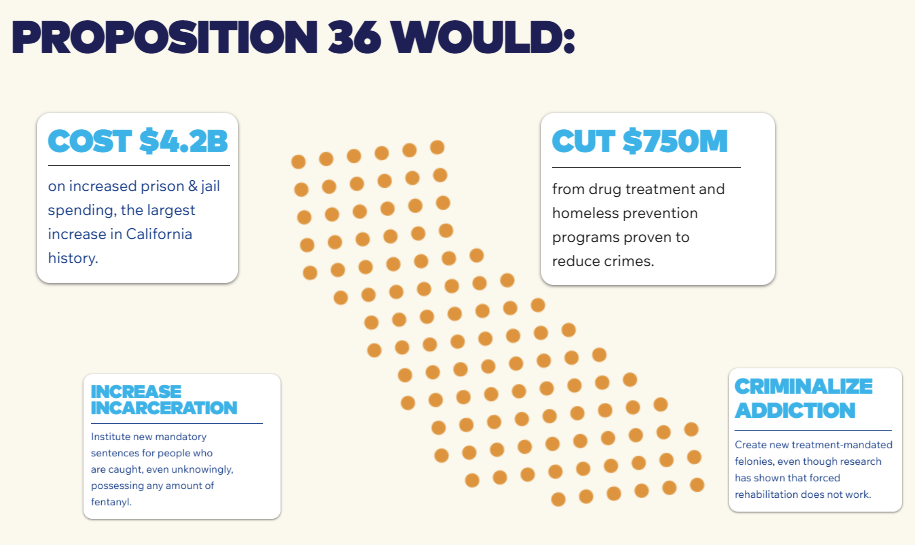Davis Vanguard - Prop 36 Would Bring Back Prison Overcrowding
Prop 36 would increase incarceration at the expense of draining money from victim funds and prisoner reentry programs

The following guest commentary, "Prop 36 Would Bring Back the Nightmare of Overcrowded Prisons" appeared in the Davis Vanguard, and is written by Vanessa Vasquez. Vasquez is a formerly incarcerated Californian and a volunteer with the abolitionist organizations Sister Warriors Freedom Coalition and the Anti Recidivism Coalition.
Excerpts appear below.
*****
Californians will be voting on a ballot initiative on November 5 that, if passed, would roll back the progress our state has made on prison overcrowding and over-incarceration for nonviolent offenses. Proposition 36 would put more people behind bars for petty theft and drug possession, costing taxpayers $100 million a year and draining money from victim funds and prisoner reentry programs.
The misguided initiative wouldn’t reduce crime, but it would worsen outcomes for incarcerated people who depend on skills training programs, sober housing, and support to avoid recidivism. I should know. I’ve spent the majority of my life behind bars. I was locked up in juvenile hall when I was thirteen and spent the next 20-plus years in and out of prison. I’m now 38 years old, enrolled in college for the first time, working, and doing everything possible to stay out of prison. I’m studying law and policy so that I can better advocate for adults and children caught up in the carceral system.
I wouldn’t have gotten where I am today without the resources I was able to access in prison and upon my most recent release – resources that Prop 36 could take away.
While in prison, I took job training and resume-building classes and learned how to go on a job interview. When I got out, I moved into a sober living facility so that, this time, I didn’t end up back on the streets. For the first time, I had a safe, drug-free place to go with accountability and support, and I wasn’t left all on my own.
I spent time in the notorious women’s prison Chowchilla during that era of overcrowding. We had eight people in each cell, and when there were no more bunk beds left, they housed people in our day room, where we were supposed to be able to spend time when we were allowed out of our rooms. Then, they filled the gym with 200 more beds, so we could no longer use the space for exercise. All those additional people needed bathrooms, so our prison cells were opened up and shared by everyone housed in the gym or the day room. Our living conditions got less and less sanitary because keeping things clean and hygienic with so many people packed in was impossible. And because of the overcrowding, prison services were backed up, meaning that many of us lost our chances to take classes or access programming that might have helped us.
In 2014, Proposition 47 helped tackle that nightmare with humane solutions. But here we are in 2024 contending with a regressive ballot initiative that would bring the nightmare of overcrowding back.
*****
Prop. 36 would amend state law to increase penalties for several drug and theft crimes. These changes would disproportionately impact Californians of color given racist practices in the justice system as well as social and economic disadvantages that communities of color continue to face due to historical and ongoing discrimination and exclusion.
By increasing punishment for several drug and theft crimes, Prop. 36 would create substantial new costs, including for incarceration and the court system, at the state and local levels. However, the measure would provide no new revenue to pay for these expenses. State and local leaders would face the prospect of curtailing funding for existing public services in order to make room in their budgets for the unfunded costs imposed by Prop. 36.
Instead of increasing incarceration, state leaders should prioritize policies and interventions proven to reduce crime, enhance public safety, and expand behavioral health treatment options. Effective measures include increasing affordable and supportive housing, expanding economic security programs, broadening access to health care and behavioral health services, supporting education and youth intervention programs, improving recidivism reduction strategies, and implementing equity-centered policies that target vulnerable residents. By focusing on these proven strategies, we can create safer, more equitable communities for all Californians.
You can read the full commentary "Prop 36 Would Bring Back the Nightmare of Overcrowded Prisons" at the Davis Vanguard. Their work is committed to transparent journalism, driving reform, amplifying voices, and exposing systemic injustices, particularly those affecting marginalized communities.










